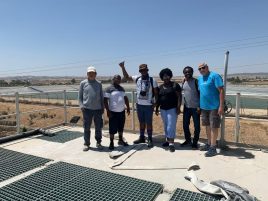
The purpose of the visit was for the UFS delegation to learn and be exposed to water and sanitation management in Israel, and to develop academic and research ties around water and other environmental issues within a transboundary context with the Arava Institute for Environmental Studies. Dr. Clive Lipchin, Director of the Institute’s Center for Transboundary Water Management hosted the delegation.
A main objective of the visit was to learn about the work of the Arava Institute in the water sector, and to consider how to bring this information back to South Africa. Potable water is a scarce resource in South Africa, aggravated by the lack of systems and infrastructure that would alleviate these ongoing issues. South Africa has also been plagued by droughts, resulting in “water-shedding”; Nelson Mandela Bay is a case in point as it nears the imminent ‘Day Zero’.
The delegation first visited one of Israel’s wastewater treatment plants where water is not only treated but also reused for irrigation by neighboring farms. The Israeli approach to wastewater management for increasing water supply through water reuse is a key policy in the country’s water management approach. Water goes through a sophisticated and sustainable economic cycle, creating synergy between domestic and agricultural use.
The delegation also engaged in collaborative dialogue with Arava institute faculty, during which transboundary environmental policy issues were presented. For example, water issues impacting the Bedouin communities in Israel are very similar to the ones being experienced by South Africans in rural communities, or communities that struggle to have access to a steady supply of water. The delegation also met with Palestinian partners working with the Arava Institute, and visited Palestinian farmers on site. The Arava Institute’s work with Bedouin, Palestinian, and Jordanian communities helped to shed some light and hope for tangible solutions that can be taken up by South African communities. Collaboration between South African and Israeli academics, students, and researchers is a significant demonstration of the benefits of countries working together for the betterment of their citizens’ and peoples’ livelihoods.
South Africa suffers immense challenges when it comes to supplying water to rural or informal communities. The UFS delegation took a tour of off-grid water and energy projects in the West Bank. These projects are undertaken jointly by the Arava Institute and Palestinian colleagues.
This comprehensive trip provided the delegation with a unique perspective of the intuitive and cutting-edge technologies used in the Israeli water industry, as well as the challenges being faced. These challenges are relatable to the issues faced in South Africa, yet illustrate how they may be overcome.
May this be the start of more transboundary scientific collaborations of this kind. We look forward to a return visit of Arava Institute representatives in South Africa in the not-too-distant future, and encourage more collaboration of this nature between the two countries.

